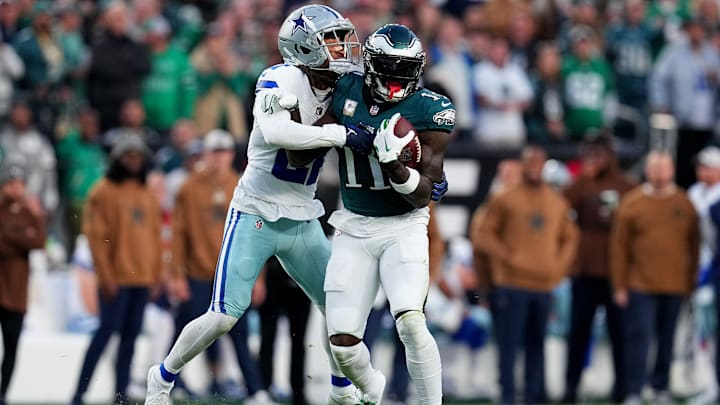2. Chuma Edgoa illegal formation in 4th quarter
This error didn't have a huge say in the game's outcome, but it was indefensible.
On 1st and goal with the Cowboys trailing 28-17 with 6:30 left in the fourth quarter, Chuma Edgoa was called for an illegal formation that wiped out a Tony Pollard touchdown. The kicker? Dak Prescott confirmed with the official before the snap that Edoga check in as an eligible receiver.
You can see Dak Prescott confirming with the official that #71 declared as an eligible receiver.
— Nate Tice (@Nate_Tice) November 6, 2023
Illegal formation penalty still thrown. Wiping away a touchdown. pic.twitter.com/8g2R6POTfW
Prescott threw a touchdown to Jalen Tolbert on the next play, so the Cowboys didn't lose any time, but that bailed out the refs. If Dallas doesn't score there, you're talking about the refs costing them an invaluable six points in a two-score game late in the fourth quarter even though Prescott double checked that Edoga was eligible.
1. Stephon Gilmore pass interference on A.J. Brown
Like roughing the passer, there's no clear definition for what qualifies as pass interference. The definition fluctuates week-to-week and that continued Sunday when Stephon Gilmore was flagged for DPI on A.J. Brown late in the third quarter.
It appeared that Gilmore interfered with Brown's route, but the WR gave up on the route as Jalen Hurts sailed the ball out of bounds. It was clear to everyone watching that Hurts was throwing the ball away to set up a manageable 3rd and 5.
Of all the bad/missed calls yesterday, this one is the most confusing.
— Marcus Mosher (@Marcus_Mosher) November 6, 2023
How is this DPI on Stephon Gilmore? pic.twitter.com/kLmN6W29Oo
Unlike Bradberry's illegal hands to the face on Gallup, this call warranted the ref in question to pick up the flag. The Eagles got a fresh set of downs and went on to score a touchdown to take a 28-17 lead before the fourth quarter.
The Cowboys defense could have came up with a stop to overcome the penalty, but that's not the point. It was a free 17 yards that took Philly from their own 42 to Dallas' 41, which essentially put them in four-down territory.
Again, the refs aren't the reason Dallas lost. They made too many mistakes to deserve to win the game, but multiple things can be true: the Cowboys shot themselves in the foot but the Eagles also got the benefit of a home whistle in a high-leverage situation on more than one occasion.
